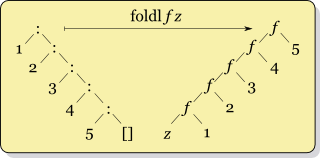# Type Classes, Continued --- CS 135 // 2021-03-02 <!--=====================================================================--> ## Administrivia - I am being much more flexible with deadlines due to some technical difficulties with the CS desktop + Let me know if you need an extra day or two - <!-- .element: class="fragment"--> Firefox issue on CS Desktop + A backup web browser is not installed: `Web` <!--=====================================================================--> ## Class Presentations - During weeks 8 and 9, we will have class presentations about other programming languages - <!-- .element: class="fragment"--> Presentations will be in groups of 2 and you will be able to choose your own partner + With special permission, I may permit you to present individually or as a group of 3 - <!-- .element: class="fragment"--> Each of you will choose a language to present <!----------------------------------> ## Languages to Choose From <div class="twocolumn" style="font-size: 85%"> <div> 1. Javascript 2. Perl 3. Ruby 4. C++ 5. Rust 6. Swift 7. Kotlin 8. Go 9. Scala </div> <div> 10. Julia 11. Lisp 12. Lua 13. C# 14. Prolog 15. Fortran 16. Cobol 17. Pascal 18. F# </div> </div> <!----------------------------------> ## Format of Presentations - Your group will select a language and prepare the following: --- 1. <!-- .element: class="fragment"--> A "cheatsheet" for the class about the language 2. <!-- .element: class="fragment"--> A 10-minute presentation about the language <!----------------------------------> <!-- .slide: data-background-iframe="https://www.cs.carleton.edu/faculty/dmusicant/cs251f09/talkgrading.htm" data-background-interactive --> <!--=====================================================================--> # Lab 3 Debrief <!-- .slide: data-background="#004477" --> <!--=====================================================================--> # Questions ## ...about anything? <!--=====================================================================--> # Type Classes <!-- .slide: data-background="#004477" --> <!--=====================================================================--> ## Type Classes - Typeclasses are like **Java interfaces** + They constrain an generic type to support certain operations ```haskell sort :: Ord a => [a] -> [a] sort [] = [] sort (x:xs) = left ++ [x] ++ right where left = sort (filter (<=x) xs) right = sort (filter (>x) xs) ``` <!----------------------------------> <!-- .slide: data-background-iframe="https://martingalemeasure.wordpress.com/2014/07/07/haskell-numeric-types-quick-reference/" data-background-interactive --> <!--=====================================================================--> # Folding <!-- .slide: data-background="#004477" --> <!--=====================================================================--> ## Folding - Many functions take a list as input and "smashes the elements together" into a single return value -A fold on lists has the following type: ```haskell foldr :: (a -> b -> b) -> b -> [a] -> b ``` <!----------------------------------> ## Fold Right ```haskell foldr :: (a -> b -> b) -> b -> [a] -> b foldr f z [] = z foldr f z (x:xs) = f x (foldr f z xs) ``` - Suppose I call the above function with: ```haskell foldr f z [1,2,3,4,5] ``` - <!-- .element: class="fragment"--> The above implementation would produce:  <!-- .element: class="fragment"--> <!----------------------------------> ## Fold Left - We could have implemented the folding operation in a different way:  ```haskell foldl :: (b -> a -> b) -> b -> [a] -> b foldl f z [] = z foldl f x (x:xs) = foldl f (f z x) xs ``` <!-- .element: class="fragment"--> <!----------------------------------> ## Foldable Type Class - This "foldable" property doesn't only apply to lists, but all sorts of data structures, such as trees - <!-- .element: class="fragment"--> As a result, the true type of `foldr` is: ```haskell Foldable t => (a -> b -> b) -> b -> t a -> b ``` <!--=====================================================================--> # The `$` Operator <!-- .slide: data-background="#004477" --> <!----------------------------------> ## The `$` Operator - You may notice the operator `$` used in Haskell code-bases, which is used to reduce the number of parentheses in code: - <!-- .element: class="fragment"--> The following two expressions are equivalent: ```haskell head (reverse "abcd") head $ reverse "abcd" ``` - <!-- .element: class="fragment"--> Haskell is *left associative* by default, but the `$` is *right associative*, so it effectively evaluates the right-hand side first, even if there are no parentheses there <!--=====================================================================--> # Self Checks <!-- .slide: data-background="#004477" --> <!----------------------------------> ### Check 3 What is the type of: ```haskell \t -> (fst . fst $ t, (snd . fst $ t, snd t)) ``` 1. `(a, (b, c)) -> (a, (b, c))` 2. `(a, (b, c)) -> ((a, b), c)` 3. `((a, b), c) -> (a, (b, c))` <!----------------------------------> ### Check 7 What is the type of: ```haskell \x -> case x of (True, "Foo") -> show True ++ "Foo" ``` 1. `Either Bool String -> String` 2. `(Bool, String) -> String` 3. `Show a => (Bool, String) -> a` <!--=====================================================================--> ## Lab Time - Please turn on your camera when in a breakout session if possible - <!-- .element: class="fragment"--> Some students are hard of hearing and rely on lip-reading to follow along in conversation <!----------------------------------> <!-- .slide: data-background-iframe="/teaching/2021s/cs135/schedule/" data-background-interactive -->